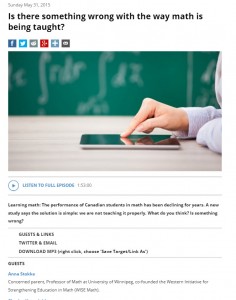As I am reflecting on my experience of working with Chinese mathematics and science teachers, my students (in a graduate course on mathematics and science education I am currently teaching) pointed out to me that I missed a CBC radio discussion on the Cross Country Check up that focuses exactly on this problem. I am glad that she did remind me to listen to it… It is interesting to hear how people push to go back to route memorization instead of focusing on developing the knowledge of mathematics teachers. For example, see the book by Liping Ma “Teaching Elementary Mathematics”. It as an example showing that Chinese teachers can show multiple ways of explaining a mathematics question, while North American teachers often memorized techniques but they cannot explain where they came from. A famous phrase found in North American classrooms relevant to fraction division is: “You don’t need to know why, just invert and multiply”. For example, this is what one of the elementary teachers said in a comment to the CBC radio show and she even did put her name down:
“The problem is teachers. I’m a teacher. Unfortunately, I didn’t know how to teach math from grade K to 8… I could have muddled along, imparting my lack of interest or worse, but I chose to not teach math and leave it to someone who is good at it. But there are many many teachers out there — I know, I was one — who don’t get math, because WE were never taught to appreciate math and use it properly or it’s just not the way our brains work.” – Margaret Pogue, Victoria, BC
I could not have expressed it better than Margaret Pogue and I feel that it is our fault, as teacher-educators who certify elementary teachers who are not prepared to teach mathematics and science. I agree with the idea of balanced teaching but I still believe that in our country few teachers in elementary schools view mathematics (or science) as exciting subject that goes beyond memorization or not memorization of multiplication tables… For example, a girl from ON who called on the program said exactly that – if teachers themselves are not excited about mathematics and teaching mathematics it has a big effect on the students!
I think the concerns of Anna Stokke is well founded: http://wisemath.org/contributors/anna-stokke/. She is a math professor who has her own children in elementary school and she is very concerned about how mathematics is taught in our schools. However, I am so much afraid that we will throw out the baby with the bathwater. I do think that inquiry, discovery and curiosity should be embedded in learning. However, I also think that discovery learning should NOT negate practice. What Anna Stokke is talking about in my view stems from the lack of content and pedagogical knowledge of teachers who teach mathematics (she did mention it). I think a good mathematics or science teacher should encourage multiple methods and a teacher should know how to explain a problem from multiple perspectives (I could see it clearly while working with Chinese teachers – there are many ways to solve and explain a mathematics problem). From what I understand the discussion here is mainly focused on how mathematics is taught in elementary schools (multiplication, etc.). Most of the elementary teachers in Canada have very limited knowledge of mathematics and mathematics pedagogy. Many of them are severely math and science phobic. As Anne Stokke correctly pointed out in Teacher Education programs across the country we have no regulation to check teachers’ knowledge of the subjects they teach, including mathematics. Many elementary teachers have never had a chance to enjoy mathematics and see its value and beauty. The discussion here is about arithmetic and not even about mathematics. THIS IS A HUGE ISSUE. I have been teaching mathematics at various levels, including elementary school and I think the issue is much deeper than the discussion presented in this radio show… I think unless we change who becomes a teacher, how teachers are prepared, how much meaningful professional development teachers get opportunity to participate in, we will not be able to address this problem.
I also think that the report of Dr. Stokke and the way she talks about it provides unbalanced and inaccurate view of traditional methods of instruction versus a student-centered approaches. The discussion in the shows kept focussing on memorizing of a multiplication table, but PISA test IS NOT about memorizing facts or doing problems faster and faster. Moreover, we have a lot of evidence that learning by memorization does not produce the best outcomes, so I think the report and the discussion are somehow skewed in the wrong direction… Lastly, they kept saying how well Korean students are doing on these tests, but I have spoken to my Korean colleagues and THEY ARE not happy about how their students experience mathematics and science education. I think if we want to look at a country that is doing better than us and we want to emulate, we might rather want to look at Finland.
Like Anna Stokke I am also a mother of two children. And in many ways, I have always been responsible of their mathematics education. My goal as a parent and as a teacher to expose them to interesting mathematics problems, to the way WHY mathematics ideas work, how they develop. I wanted them to experience a little bit of the view of mathematics and science expressed by Richard Feynman – mathematics and science as a way of figuring things out and not just memorize multiplication tables…

Take a look at the PISA test – is it all about memorization or is it about problem solving and using mathematics in a meaningful way: An example of PISA questions. You can also look at TIMMS and other tests.

